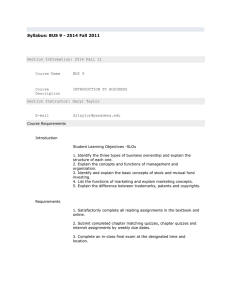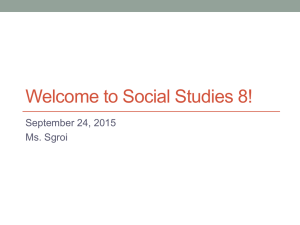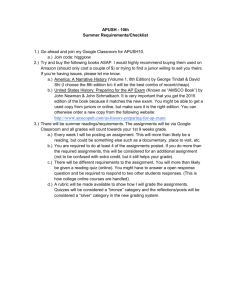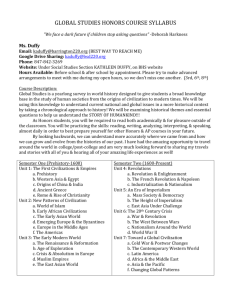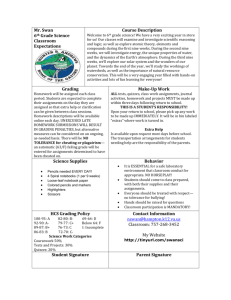Back-to-School-Night presentation
advertisement
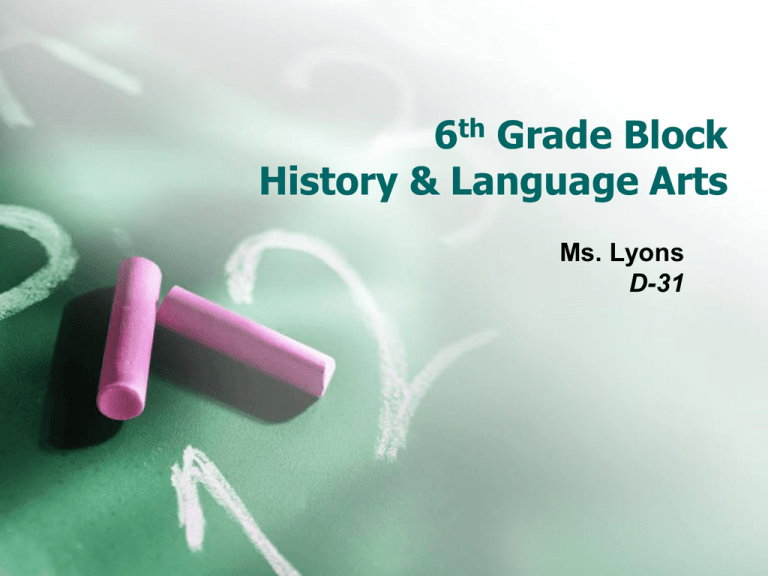
6th Grade Block History & Language Arts Ms. Lyons D-31 Welcome • Please fill out a parent information sheet: • Please take one of each: School Site Council ballot (yellow) Parent information form Block presentation is available at the bottom of my website homepage • We’ll begin shortly. Background • 25th year in the teaching profession • 6th Grade Language Arts • B.S.- San Diego State University • M.A. –St. Mary’s College • Ed.D. at University of San Francisco Officially Dr. Lyons 6th Grade Transition • Procedural What does each teacher require? How do I organize my materials so I know what’s happening for each class? How do I arrange my time to meet all the demands in my life? • Social New friends, cliques, differing levels of maturity • Academic Grading system point-based Less one-on-one support More need to be independent learners Support the Transition • Check teacher websites weekly • Make sure child writes homework in organizer • Initial organizer • Help your child make weekly plans to attend to their tasks • Clean out backpack/binder weekly • Acknowledge students’ positive efforts for selfcontrol, self-management, and independence • Use a timer to keep focus during homework time Harvest Park Character Ed. • Compassion • Honesty • Respect • Responsibility • Integrity-Academic Integrity • Self-discipline Academic Integrity • Students’ work must be their own Over-helping from tutors on writing assignments • Pressure to be perfect Cheating on homework/quizzes/tests • Mistakes are part of learning • Bragging & Comparing Professional Mission Inspire inquiry Encourage risk-taking Facilitate independent learning skills Develop depth of thought Celebrate students’ unique gifts Nurture social skills & friendships Educational Philosophy Parents & teachers are partners Utilize multiple modalities for learning Honor individual strengths Explicit instruction Assessment drives instruction Deliver instruction in concert with BRAIN-MEMORY learning theory Differentiated Curriculum Acceleration/Compacting Testing out of material, independent work, selfpaced Depth Develop expertise & learn a subject in great detail Novelty Student centered, interest-based, exhibit creative products demonstrating learning Critical Thinking Skills: Open-ended assignment, higher level of Bloom’s Taxonomy Differentiated Instruction Bloom’s Taxonomy Knowledge—recall, listing, defining Comprehension—summarizing, Application—use knowledge in new situation Analysis—compare/contrast/ infer/deduct Synthesis—create novel ideas from prior knowledge Evaluation—judge & defend judgment Habits of mind Self-motivation Self-regulation Independence Reflection Curriculum Common Core State Standards Pleasanton Unified School District Course of Study Technology • Google PUSD accounts Google Classroom Google Presentation Google Docs Google Drawing Google MyMaps • BYOD-Bring your own device: Chromebooks, laptops, tablets with Chrome added 12 Chromebooks • Study Island On-line standards assessment & remediation Will start in 2-3 weeks Social Studies • Utilize GRAPES as overarching theme Geography Religion Achievement Political Structure Economic Structure Social Structure Social Studies Topics • Mesopotamia • Egypt/Kush • Ancient Israelites • Ancient India • Ancient China • Ancient Greece • Ancient Rome Learning Objectives • For each unit, your child will receive A list of objectives & vocabulary words that will be used to write test questions A table of contents Weekly review of instruction matched to instructional objectives Homework based on answering questions on study guides Review games two days before tests Study Strategies instruction and reflection Differentiated projects that highlight interest areas Social Studies-Continued Class work Reading for information Textbook Handouts Digital research Demonstrate Comprehension Artistic-posters, models, diagrams, digital displays Verbally-skits, role-play, imposter interviews, debates, simulations Written-research reports, essays, articles, poetry, Grading Daily preview/review Unit packets—TOC, notes, handouts, unit reflection Quizzes & tests Daily work- completeness, accuracy 50% test/quizzes/50% class work/homework Text Ancient Civilizations Reading General Topics-Literature Plot elements Characterization Theme Literary Devices Poetry General Topics-Non-Fiction Main idea & details Citing evidence to support analysis How events & ideas are developed in non-fiction Reading Literature Reading The Boy in the Painted Cave The Cay Where the Red Fern Grows Literature Anthology- Holt Book Club: free choice—2nd semester Informational Texts Scope magazine articles Various articles connected to content Informational text from Holt Literature Anthology Reading continued Class work-Gradual Release of Responsibility Thinking aloud-Read aloud Shared response-Shared text Independent reading response/Conferencing Homework Reading logs-practice reading strategy Literary Analysis Preparing for discussions & Socratic seminars Grading Project Rubric score Comprehension Assessments Response Journals/reading logs/book projects 20 Book Challenge/Book Clubs Writing Main focus-Essay with text-based responses & analysis-(2+ per genre) Autobiographical Narrative—1st quarter Response to Literature-2nd & 3rd quarter Argumentative Research Reports-3rd & 4th quarter Writer’s Workshop Analyze Mentor Texts Mini-lesson Independent practice/conferring/reteaching Pre-writing, drafting, revising, editing Publishing Spelling/Vocabulary Guiding Questions What are the origins of English words? What are the structural elements of words? How can you learn the meaning of new words? What are the levels of “understanding” a word? How does word knowledge impact your understanding of the curriculum? Learning Material 10 vocabulary words Text: Vocabulary for Achievement Weekly homework menu—on website Weekly quiz on Friday Grammar Guiding Questions How are different parts of speech formed? How does knowledge of POS impact writing? How does punctuation or lack of it impact writing? What dictates which words are capitalized? Assessments Monthly grammar pre-assessments & quizzes Compact out if score 90% higher on preassessments Drill & practice work—2 homework assignments/week Text: Holt Handbook & No Red Ink Website Apply skill in writing & editing Language Arts Grading 15% Spelling 10% assessments & 5% assignments 15% Grammar 10% assessments & 5% assignments 35% Reading 20% assessments, 10% assignments, 5% 20 Book Challenge 35% Writing not weighted Assessments Based on evidence of mastering the state standards: Projects/Writing/ AssignmentsRubric descriptors correlate to grades Skills practice- percentage scores Tests fill-in, multiple choice-percentage score essay response-rubric scores Homework Homework is assigned every Monday & is due the following Wednesday or Friday Spelling/vocabulary- 2 assignments a week Grammar- 2 times a week Reading or Writing ~ 1 or 2 assignments a week 20 Book Challenge Reading History ~ 2 assignments a week Tutorial, homework time, & make up days Mondays-Thursday at lunch Late Work Missing Work Student will fill out a missing work form & bring it home to have it signed. If not returned the next day, the student will email/call home when work is not turned in on a due date Extenuating circumstance-note/phone call Late work accepted only during the first semester the day after it’s due for 50% credit Grades • Updated bi-weekly on Q-Zangle • Can use your own code to access your child’s grades as often as you’d like Absent/Late Work Absences Retrieve work from weekly file Have one week to turn in work Discipline Policy Rules Consequences 1. Arrive to class on 1. Warning time. 2. Follow procedures and directions. 3. Begin work immediately. 4. Focus attention on person speaking. 5.Treat others with kindness & respect 2. Think Sheet 3. Miss Break 4. Home Contact 5. Office Referral Communication Website Update on Fridays Post homework on website weekly Instructional objectives Project descriptions, due dates Upcoming school events Phone calls Share success and concerns Check in Notes & email Communicate progress Share successes Contact information E-mail Preferred means of communication elyons@pleasantonusd.net Web page: Link from Harvest Park site http://teachersites.schoolworld.com/ webpages/ELyons/ LET’S HAVE A FABULOUS YEAR!!! • Time of transition • Change takes time for some kids • Challenge is its own reward • We are a team
